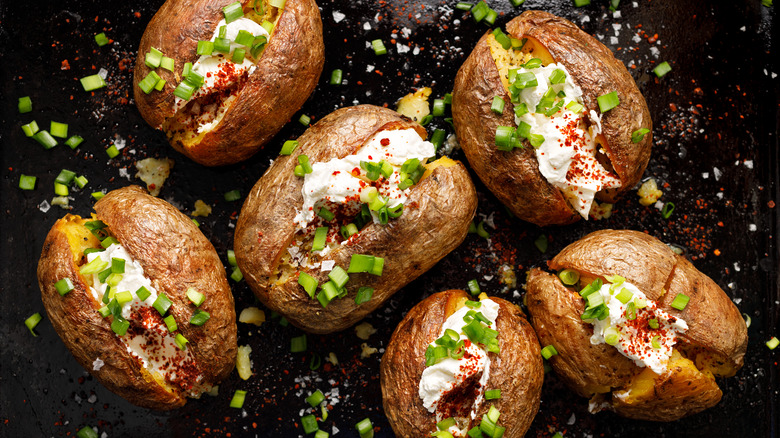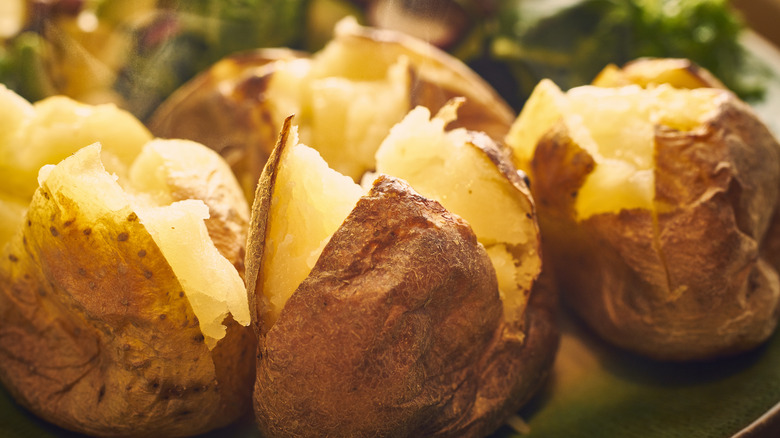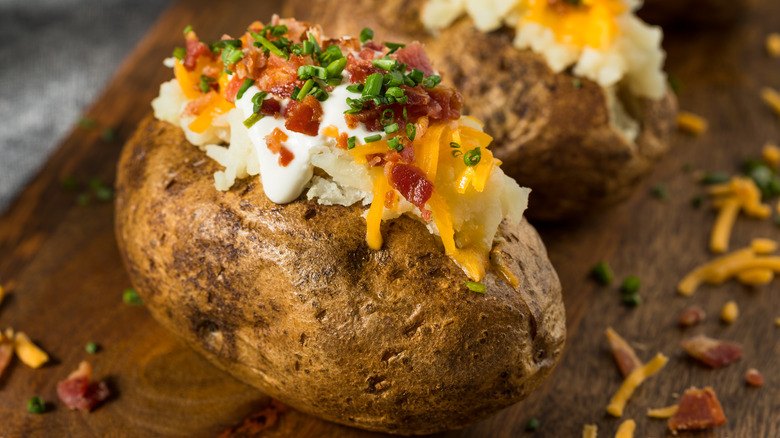For The Best Baked Potatoes Of Your Life, Try A Salt Water Brine
With its crisp skin and soft, fluffy flesh, a simple baked potato makes a great side dish — whether for a family dinner or a barbecue. But with a little TLC, not to mention some tasty toppings, a baked potato can easily become the star of the show.
Many baked potato tips center around how best to prep and cook the starchy favorite, from rubbing the skin with oil to whether or not to use foil. Alton Brown's infallible method for crunchy potato skin involves pricking the potatoes with a fork prior to cooking and leaving them uncovered — while other chefs recommend parboiling the potatoes before baking them. But another tip well worth trying involves brining the raw potatoes in salt water before they're cooked in a hot oven.
Brining is a technique usually applied to meat or poultry, involving infusing the protein with extra flavor and tenderness by bathing it in a solution of salt water, sometimes with sugar or extra flavorings added. Salt potatoes, where the small potatoes are boiled in brine, are a historic and much-loved specialty of Syracuse, New York. And when applied to baked potatoes, the brining method also delivers extra flavor but does not take the time or effort you might expect. Just a little dunk in some salt water can result in a superior spud that's perfectly seasoned.
Brining potatoes gives an evenly seasoned crust
Potato skins are delicious when perfectly seasoned. But all too often, it's hard to get the salt to cling evenly to the skin, resulting in some areas with ample seasoning and others that are sadly lacking. Brining solves that issue since the saltwater solution allows the flavor to evenly coat the whole exterior of the potato.
While brining can often be a lengthy process with meat, that's not the case with potatoes. Simply dipping the potatoes in a saltwater solution is enough, which can be done in under a minute. And don't worry about the potato being wet from the solution, as the heat of the oven causes the water to evaporate but the salt to remain on the skin, meaning you're left with a tasty, well-seasoned crust.
If you're worried about the saltwater brine from the potato dripping in the oven, then popping the brined potato on a rack above a baking sheet captures any drips. And this has the added advantage of helping the potato cook more evenly, as the hot air in the oven can circulate in a more uniform way all around the spuds as they cook.
Other top tips for perfect baked potatoes
A baked potato is a simple enough dish to prepare, but there's a huge difference between one that's just okay and one that's absolutely perfect. As the ingredients for basic baked potatoes are minimal (potatoes, oil, salt), it means there's no room for error. But as well as brining, there are some other steps that can help your baked potatoes be the best they can be.
Starchy Russet, or Idaho, potatoes are great baked because they don't contain much water, resulting in a better texture with fluffy insides. Pricking the skins with a fork prior to dunking in a brine bath helps steam to escape from the tubers as they cook. And when it comes to the ideal temperature, you don't want to go too hot as it can make the potato skin tough and overcooked. Around 450 degrees Fahrenheit for 45 minutes to an hour is ideal.
If you've tried brushing potatoes with oil before cooking them but have been left disappointed by the slightly soggy texture, then try applying the oil later in the process. Oiling the potatoes when they're already partially cooked and drier — before giving them a final 10 minutes or so in the oven — gives a crisp tasty result, almost like a potato chip. Then all you need to do is add some unique toppings to make a complete meal and elevate the humble spud to the status it truly deserves.



